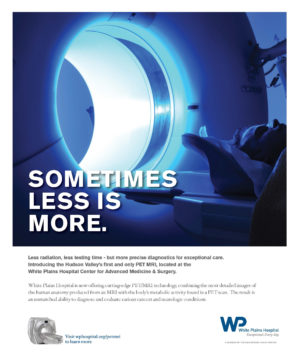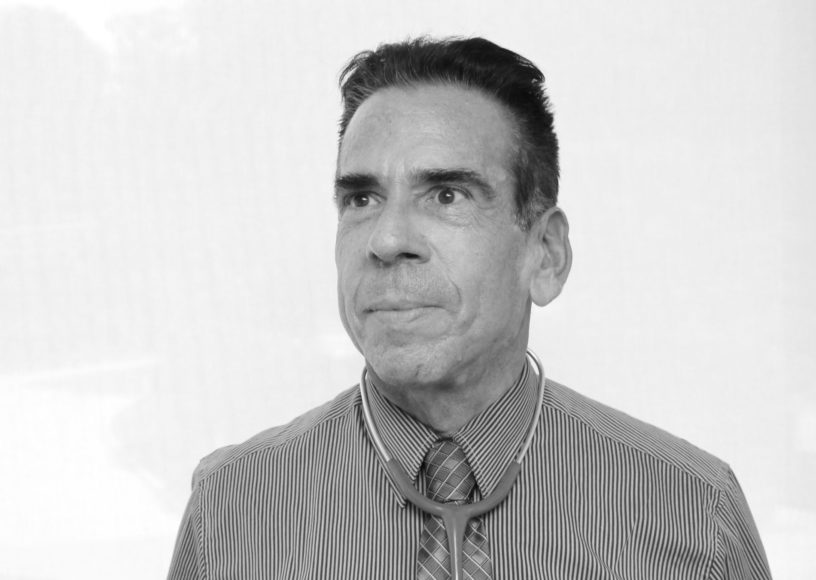Gary Rogg, M.D., has the prescription for better patient care in the time of Covid — and really in any other time of medical distress when the answers aren’t immediately clear.
“We try to inspire hope in people,” he says of himself and his team at Westchester Medical Center (WMC). For Rogg, it’s a career-defining sentiment, one he has applied to the flood of Covid sufferers who continue battling symptoms that can’t quite be defined.
At the start of the pandemic, Rogg — an attending physician in the department of internal medicine at WMC and assistant professor of medicine at New York Medical College, both in Valhalla — was tasked with overseeing care as Covid section chief, a position that presented him with new problems to solve.
“It quickly became obvious that people weren’t getting better,” he says. He was seeing what the medical community has termed long haulers, those patients with symptoms that persist long after they’ve weathered the initial onset of virus.
“About 10 percent of people with Covid have lingering symptoms like fatigue, brain fog and muscle aches,” he says. They may feel fine for two or three days and then they have this wave of not feeling well again.” That nebulous waxing and waning defies common perception.
“People were being told: ‘Oh you’re fine’,” he says, indignant at that callous dismissiveness.
So, he cofounded WMC’s Post Covid Recovery Program, an integrative program that brings together a host of experts from cardiologists and pulmonologists to kidney and rehabilitation specialists. It’s the kind of personalized care patients need more than ever.
“Covid made people more anxious, nervous,” he says.
It is indeed scary when you begin to fear your symptoms could be everlasting.
But Rogg cites comparative coronavirus examples that might give some foothold to worried sufferers. He points to the SARS (Severe Acute Respiratory Syndrome) outbreak in 2002 as an example, “The sickest of the sick got better in two years,” he says. “The intensity and frequency (of symptoms) got less over time.”
Rogg’s insistence on giving his patients confidence and assurance in the face of uncertainty has defined his life and career. A New Yorker through and through, Rogg grew up in the Bronx near the Pelham Parkway, a product of public school. He went on to The Bronx High School of Science then New York University in Manhattan for his undergraduate work and NYU’s Grossman School of Medicine.
“I wanted to be a doctor since I was in third grade,” he said, though he joked that baseball player and astronaut were other strong career contenders at that age.
Both of those options were trumped when an uncle brought Rogg to work one day at Memorial Sloane Kettering Cancer Center in Manhattan. “I thought it was just the most amazing, coolest thing to get people out of bed and on their feet again.”
He trained in internal medicine, doing his residency at Jacobi Medical Center, back on Pelham Parkway in his old neighborhood. “I wanted to take care of people in the area I grew up in,” he says.
Rogg is driven by giving a personal experience to his loyal patients.

In the early days of his career, he worked in an emergency room setting but missed forging a connection with people over time so phased back to internal medicine. He wanted to know how his patients were doing. He wanted to know if he had an effect on their health.
He spent 23 years working on staff at Montefiore Medical Center: Einstein Campus in the Bronx but is now director of APS Practice Development at Westchester Medical Center, the flagship of WMC Health Network, which comprises 10 hospitals throughout the Hudson Valley.
It was here he started a regional headache center for migraine sufferers, cofounding WMC Headache Specialists, a career move that probably best equipped him for dealing with patients long frustrated by ongoing symptoms with seemingly no cure.
Rogg’s interest in chronic headaches stemmed from those early years working in the ER. “So many people came in with severe migraines,” he says. “We could break them in the emergency room, but what happens after that?”
He witnessed many doctors offering medication after medication. But he had a better vision.
The center’s unique approach includes an interdisciplinary team comprising a headache neurologist, a pain management specialist (who tries tactics other than medication, like trigger point injections and ultrasounds) as well as a plastic surgeon who can dissect the pain-causing nerve. The personal approach gives patients the antidote they’ve been searching for — hope.
Both severe headache sufferers and Covid long haulers are ostensibly battling the same frustrating lack of it. And that’s unacceptable to Rogg.
“There is always something you should be able to do,” he says, adding that the greatest message he’s gotten from patients over the years is, “Never take what anybody says for granted. If you let the person speak, they will always give you the answer. I tell med students and residents, ‘You’re really like a detective.”
For more, visit westchestermedicalcenter.org.
Rogg on Covid
Being on the forefront of Covid in the area, we wanted Gary Rogg, M.D., to weigh in on the vaccination debate.
He says he understands the caution people have, but his experience points him in one direction.
“Not to minimize the flu,” he says, “because it can be very, very deadly. But (with the flu) everybody has identical symptoms. And after two weeks, it’s gone. The trouble with corona is that its unpredictable.”
He fields his adult patient’s questions about the vaccines and, as always, takes them seriously. He says, sure, vaccines can have complications, but there are known ways to mitigate or treat those effects. With the virus, however, he says, “there’s people who should do well, but they die. And we don’t know why. That weights the argument (toward getting vaccinated) I think.”
But with more and more people getting vaccinated, is he seeing a return to normalcy? He’s cautious. “Yes, it is returning to some extent. At first people were reluctant to come in.” Now, he says, if you walked into the waiting room, you’d never know we were in a pandemic. The reason for that may be contradictory.
Over the last few weeks, he’s seen a lot of patients with upper respiratory issues. They want to know “Could this be corona? The answer is there’s no way to say it’s not. But when test results came back, they were all negative. And those patients were all vaccinated.”
The reemergence of run-of-the-mill symptoms that can be confused with corona may be as simple as it’s always been.
“Maybe because, now (that people have) been vaccinated, they’re not as diligent,” says Rogg. “During Covid, no one had a cold. I guess it’s a testament to washing your hands.”






